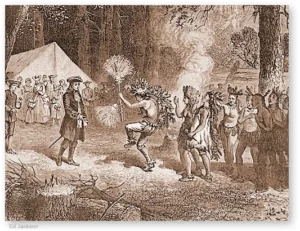Americanism Redux
March 23, on the journey to the American Founding, 250 years ago today, in 1773
Overall, the mood was rather bright and upbeat. That’s what he thought, at any rate.
Everyone seemed relieved that the biggest crime threat of this young year was dealt with, the law-breakers caught, tried, and punished. Always a good thing when counterfeiters are taken off the street and people have faith in the value and legitimacy of their money.
Virginians, go have a celebratory drink. Your colonial government is on the job. So says the royal governor, Lord Dunmore.
A slight hiccup, though. One small point of concern. At least that’s the way Dunmore phrases it in his official report to imperial authorities in England. He describes the legislative session that had lasted the prior two months before today, 250 years ago, concluding with these words:
“There were resolves which show a little ill humor in the House of Burgesses, but I thought them so insignificant that I took no matter of notice of them.”
The “resolves” were passed unanimously. Not a single “no” vote. The subject of these resolves was the organization of a “committee of correspondence” similar to what had sparked and spread across Massachusetts and surrounding colonies over the past weeks. Moreover, the resolves expressed the same zeal for protecting and safeguarding “ancient” rights and privileges in the British colonies.
So now, go back to the description that Dunmore has written today, 250 years ago: “a little ill humor…insignificant.”
Eleven men comprise the Virginia Committee of Correspondence. A sprinkling of radicals and moderates exist among them. The question is what defines the terms, how enduring the terms are, and which term proves weaker and more elastic than the other.
This dozen-minus-one has moved quickly in recent hours. They’ve chosen a three-man executive committee. They’ve drafted a cover letter to be sent to each colonial legislature and its “Speaker” or elected presiding officer. The letter encourages all Speakers and legislatures to increase their interaction about new imperial, anti-colonial policies. Embedded in the lines is a hint at a forthcoming inter-colonial meeting, with “representatives” of each legislature-based Committee of Correspondence gathering to think, plan, and act.
A particular member of the dozen-minus-one seems to stand out—Dabney Carr. Carr is quick-witted, serious, dutiful, hard-working, humble, modest, and avoids excess. His brother-in-law, Thomas Jefferson, is excited for his prospects and counts himself Carr’s biggest supporter and champion.
Carr sees the eleven-man Committee of Correspondence as perhaps the most important undertaking of his young life.
(Dabney Carr)
Also
As Virginia’s royal governor closes the legislative session and the Legislature’s eleven-man Committee of Correspondence springs to life, 35-year old Phoebe Lewis Morton walks into the warehouse and mercantile store in Philadelphia. Slowly, she moves among the items—bottles of wine and rum, barrels of sugar and tea and coffee, containers with ginger and allspice and nutmeg, a stack of steel rods, boxes of gunpowder and bullets, and piles of cloth and woven sheets. She glides the fingers of one hand along two massive millstones, each four feet thick and nearly five feet in diameter. The variety and assortment astound.
(once owned, and gifted by, Phoebe)
Phoebe turns here, turns there, winding her way around the stacks. Every sight reminds her of him. The entire inventory reminds her of his life together with hers. But he’s dead now, and she’s a widow. The family business of Morton and Morton is liquidating after the death of Phoebe’s husband, Samuel. Phoebe is executrix of the estate and waits for the people to call on her, seeking money owed or offering money to be paid. Buyer, customer, debt collector, debt payer, they’ll sort through the stacks. One by one the items will disappear and with each disappearance, a memory of him walks out the door. From the powdery allspice to the multi-ton millstones, it will all go away.
So what’s next? No children and no husband, no family business anymore, no certainty for April or May or June. Phoebe is a devout Quaker, serious in her faith and its daily action. Likely she’ll draw the attention of another Quaker man. Possibly she’ll take a second Quaker husband. Phoebe wonders about the spring which still hasn’t sprung.
Two years younger than Phoebe Morton, today 250 years ago, is 33-year old Togulki. It’s evening along the Chattahoochee River in the town called Coweta, west of the British colony, Georgia. Togulki has blue coloring drawn on his chest and arms. He will stay up late smoking a pipe with other elders—male and female—in his family clan of the culture named the Lower Creek Nation. He’s living in the town where his mother lived, since every person among the Lower Creek natives follows the lineage of their mother. He tries to talk in a deep, loud voice, much as his grandfather and father did when they were regarded as the clan’s mico, the Creek term for “leader.” Somehow, though, the voice doesn’t work for Togulki like it did for his immediate ancestors. That’s the impression left with many people who listen to him.
(a scene forty years prior where Togulki’s grandfather would have played a major role)
Togulki is still deciding whether to attend a big meeting planned for the Georgian community, Augusta. The meeting is set for later this spring. British and colonial officials have pushed the event on the Cherokee tribes, the Upper Creek tribes, and like the dominos that fall one to another, the Lower Creek tribes. Native leaders, traders, elders, warriors and more have accumulated debts to British and colonial merchants and brokers. The white men are demanding payments due and they don’t want wampum, or Native currency. They want land as compensation for obligations owed. Tensions are rising around Augusta, across Georgia, and into parts west as British and colonial people drive ever harder and deeper into Native lands. As of now, nearly two millions acres have left Native control and entered white control. No signs of stopping. The dominos teeter to the point of leaning.
Togulki is the latest in his mother’s family line to be among the visible Native leaders in these tensions. At Augusta can he stand in the footprints of his grandfather and father? No doubt there will be multi-lingual debates, discussions, haranguing, and strong-arming. Facial expressions, nonverbal communication, hidden agendas, half-truths, and flat-out lies and deceit. Individual people and people-based forces. Sincere gifts and dangerous substance abuse.
Across the Chattahoochee, the smell of pipe tobacco and the soft hoots of owls arise. Across Philadelphia, the goods and wares of a dead businessman’s widow spread. Across the British colonies, the next achievements of a young leader harken. Togulki, Phoebe, Dabney.
For You Now
The flow of time in your life, your community’s life, your everything’s life, goes in one direction—forward. Like the water in a river. Which means that the future is Down River, ahead of where you right now. It may be a minute ahead, a day, a year, or more, but whatever the length, it is forward from the present and I call the future Down River.
Look Down River in our story from today, 250 years ago.
Down River a few weeks and Dabney Carr dies, unexpectedly. We will never know the contributions he would have made.
Down River several years and the second husband of Phoebe Lewis Morton Pemberton is sent “into exile” by American leaders for suspected collusion with British Redcoats during the American Revolutionary War. She’s been here before as a Quaker in a time of war—first as a teenager in the French and Indian War and again as remarried adult woman in the Revolutionary War.
Down River into a timeless mist and Togulki vanishes from documentation, record-keeping, and any other making of history-from-past. The most that can be said is the most important that can be known—the lands he struggled to keep became part of a US Supreme Court ruling in 1832 that indirectly recognized for the first time a Native tribe as a formal nation negotiable only with the federal government, but to no avail: President Andrew Jackson along with nearly everyone else ignored the ruling, and the Native tribes in and near Georgia lost their claims and compensation.
Suggestion
Consider reminding yourself, three months from now, to look back at today and identify the thing that happened which no one expected in the ninety days of time. Does it point to something?












